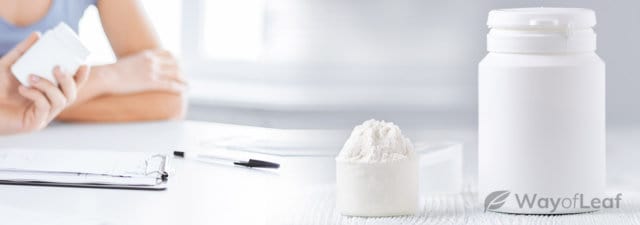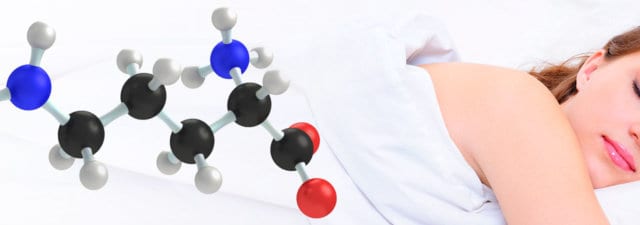Phenylalanine is an amino acid vital for building essential neurotransmitters and hormones in the body. It is found naturally in food and is also produced synthetically in laboratories.
People choose to supplement with phenylalanine for many reasons, such as helping manage conditions like depression and pain. In some instances, people use it as a nootropic drug, meaning they take it for cognitive-enhancing effects.
This article looks at the science of how phenylalanine works in the body, investigates its potential beneficial effects and provides guidance on safety and dosing.
Read below to find out more.
What Is Phenylalanine?
Phenylalanine is an essential amino acid, and an important building block for many neurotransmitters, proteins, and hormones in the body.
Unlike non-essential amino acids, phenylalanine isn’t produced naturally in the body, with the exception of human breast milk, and therefore needs to be obtained from the diet.
The molecular structure of phenylalanine comes in two different forms – L-phenylalanine and D-phenylalanine. These molecules are mirror images of one another.

The L-phenylalanine version is naturally found in foodstuffs and is the most active form of the molecule. The D-phenylalanine is a synthetic version made in a lab and is partly converted into L-phenylalanine in the body.
L-phenylalanine and D-phenylalanine are thought to have specific health benefits, and phenylalanine supplements may contain either version or an equal mixture of both, known as DLPA (DL-phenylalanine).
How Does Phenylalanine Work?
Enzymes in the body convert L-phenylalanine into a group of neurotransmitters called catecholamines. These include dopamine, noradrenaline, and adrenaline.
Because dopamine and noradrenaline play an essential role in cognitive functions, such as memory and attention, this mechanism helps explain some of phenylalanine’s nootropic effects.
Enzymes also convert L-phenylalanine into thyroxine, a hormone essential for digestion and metabolism, and melanin, a skin pigment that helps protect against damage from the sun.
Scientists have also demonstrated that L-phenylalanine can increase the release of CCK, a hormone that reduces appetite, and so may play an essential role in regulating weight.
Unlike L-phenylalanine, D-phenylalanine isn’t a starting molecule for producing other important biological molecules. However, findings have demonstrated how D-phenylalanine may be able to combat inflammation and increase the production of natural opioids, which are neurotransmitters that control pain and pleasure.
Phenylalanine Benefits
We explore the potential benefits of phenylalanine.
Treatment of Vitiligo
Vitiligo is a long-term skin condition characterized by the development of white patches on the skin. The condition is caused by a loss of the skin pigment melanin.
Because L-phenylalanine converts into melanin in the body, dermatologists give the amino acid either as an oral medication or topical cream for treating vitiligo. UV exposure is often used in combination to increase the treatment effectiveness.
Several clinical studies have confirmed the benefits of L-phenylalanine for treating vitiligo. For example, one trial found that administering oral or topical treatment combined with UV for six months gave rise to significant symptom improvement in 90% of patients.
Improving Symptoms of Depression
Because of its role in mood, scientists have demonstrated how dopamine dysregulation could be involved in depression. Therefore, L-phenylalanine may be able to help improve depression symptoms by increasing dopamine in the brain.
In line with this claim, several clinical studies have found that L-phenylalanine supplementation can effectively reduce symptoms in depressed patients.
For example, one study showed that L-phenylalanine concentrations were significantly lower in depressed compared with healthy patients and that L-phenylalanine supplementation could improve mood in 31/40 patients.
Another double-blind study showed DLPA supplementation had no difference in reducing symptoms of depression in patients compared with imipramine, a standard anti-depressant medication. However, imipramine was more effective at reducing anxiety and sleep problems.
Useful as a Nootropic
Because of its effects on dopamine and noradrenaline, supplementing with phenylalanine may have cognitive-enhancing effects.
Some online reports from sites such as Reddit suggest phenylalanine can help improve mental clarity, focus, and energy.
One study also found that treatment with DLPA could improve symptoms in adults with attention deficit disorder (ADD). However, the effectiveness was short-lived, and all benefits disappeared after three months. Other phenylalanine for ADD trial results have demonstrated no clinical improvement.
May Help Treat Parkinson’s Disease
Parkinson’s disease is a neurodegenerative disorder caused by a deficiency of dopamine in movement areas of the brain.
By increasing the building blocks of dopamine, supplementing with phenylalanine could help reverse some of the neurological pathology associated with Parkinson’s.
Online sources suggest supplementation with DLPA improved motor symptoms and tremors in patients with Parkinson’s in a small trial.
However, the current evidence for phenylalanine as an effective Parkinson’s treatment remains limited. Furthermore, phenylalanine can negatively interact with L-dopa, the standard drug used to manage Parkinson’s symptoms.
Could Help Aid Weight Loss
By aiding the release of the appetite-suppressing hormone CCK, supplementation with phenylalanine may help people with weight loss.
One study showed that giving participants high phenylalanine doses 20 minutes before a meal reduced overall daily calorie intake by 11%. However, these high doses were also associated with nausea.
Another study demonstrated that an amino acid mixture containing phenylalanine significantly reduced belly fat in over 200 overweight and obese study participants.
Possible Pain-Relief
Researchers have proposed phenylalanine may be able to increase the body’s natural pain-relief system.
Multiple pieces of research have demonstrated how D-phenylalanine can increase pain tolerance in animals.
However, in one study on human chronic pain patients, only 25% of participants experienced a decrease in pain with D-phenylalanine, and 53% experienced no difference in pain relief with D-phenylalanine compared with placebo.
Phenylalanine Safety and Side Effects
In clinical research, participants have generally tolerated phenylalanine well, and according to the FDA, L-phenylalanine is “generally recognized as safe.”
However, according to online sources, side effects from the use of phenylalanine could include:
- Nausea
- Constipation
- Headache
- Anxiety
- Insomnia
- Heartburn
- Fatigue
One observational study on over 4200 participants demonstrated an association between phenylalanine intake and hypertension. The finding has raised some safety concerns about the potential effects of phenylalanine on the heart. However, researchers are yet to replicate these findings.
Phenylketonuria
Phenylketonuria (PKU) is a rare inherited disease where people don’t have the correct gene for the enzyme that breaks down phenylalanine. This effect means phenylalanine builds up in the body to dangerously high levels, which can cause damage to the nervous system.
If untreated or unmanaged, PKU can cause irreversible brain damage in the early months following birth, leading to life-long intellectual disabilities. As such, in the US, newborns are screened for PKU, so, if positive, appropriate measures can be made.
Because of the dangers of PKU, health professionals strongly advise pregnant women to avoid phenylalanine supplements. People with PKU are also recommended to avoid aspartame, as this artificial sweetener contains high levels of phenylalanine and can increase the likelihood of its build-up and harmful effects.
Phenylalanine Supplements and Dietary Sources
Protein-rich foods tend to contain a high amount of L-phenylalanine. Good dietary sources of L-phenylalanine include:
- Eggs
- Milk and dairy products
- Fish
- Red meat
- Poultry
- Legumes
- Seeds
Phenylalanine supplements can be bought online and in health food stores. The most common products tend to be DLPA capsules in 500mg doses.

However, pure L and D phenylalanine capsules, pills, bulk-buy powders, and mixture supplements containing phenylalanine, among other amino acids, are also widely available.
If you’re interested in purchasing phenylalanine online, use TrustPilot or another verification method to ensure you can trust the vendor is selling pure, high-quality products.
Phenylalanine Dose
In clinical studies, doses of 10 grams and under of phenylalanine have appeared to be safe.
Most online vendors recommend doses of 500mg up to three times daily for nootropic effects. For depression, doses may be increased up to six grams per day, and for pain, up to 10 grams per day.
Like all new supplements and drugs, if you’re interested in using phenylalanine, we recommend beginning with a low dose and gradually increasing the amount in small increments.
Phenylalanine: A Summary
Phenylalanine increases the production of catecholamines in the brain, giving rise to potential nootropic effects. Other benefits may include aiding weight loss, improving depression, helping treat Parkinson’s disease, and managing pain.
If you’re considering using phenylalanine, be sure to consult with your doctor first, as they may be able to give you health advice that is more suited to your individual needs.




![Beta-Alanine Benefits [Exploring the Science]](https://wayofleaf.com/wp-content/uploads/2022/01/wol-banner-what-is-alanine-640x225.jpg)









